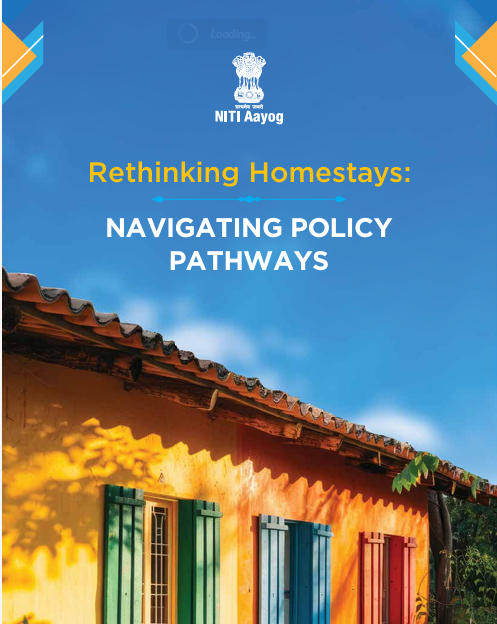NITI Aayog Report on “Rethinking Homestays: Navigating Policy Pathways”

- 28 Aug 2025
In News:
NITI Aayog, in collaboration with the Internet and Mobile Association of India (IAMAI), released the report “Rethinking Homestays: Navigating Policy Pathways”. The document provides a strategic roadmap for strengthening India’s homestay and BnB sector, emphasizing its role in tourism, rural livelihoods, and cultural preservation.
Key Highlights of the Report
- Tourism & Cultural Value: Homestays offer travelers culturally immersive experiences while promoting local entrepreneurship, heritage conservation, and community participation.
- Economic Role: They serve as engines of livelihood creation, particularly in rural and semi-urban areas, fostering inclusive and sustainable growth.
- Regulatory Approach: The report calls for light-touch, transparent regulation to balance safety, consumer trust, and ease of doing business.
- Digital Integration: Strong emphasis on leveraging digital platforms for marketing, consumer engagement, and capacity building of hosts.
- Public–Private Partnerships: Collaboration with stakeholders like Airbnb, MakeMyTrip, IAMAI, ISPP, Chase India, and The Convergence Foundation was highlighted as critical for shaping a vibrant ecosystem.
- Best Practices: State-level examples from Goa, Kerala, Uttarakhand, and Uttar Pradesh showcase scalable models in policy, governance, and community-led initiatives.
- Policy Recommendations: Suggests flexible frameworks, skill development, financial access, and infrastructure support to strengthen the sector.
Significance for India
- Tourism Development – Homestays diversify India’s hospitality sector, offering authentic alternatives to conventional hotels.
- Employment Generation – Potential to create entrepreneurial opportunities for women, youth, and local communities.
- Cultural Preservation – Encourages conservation of art, craft, cuisine, and heritage while generating income.
- Rural Transformation – Helps bridge urban–rural divides by promoting community-based tourism.
- Sustainability – Supports low-impact tourism models, aligning with SDG 8 (Decent Work & Economic Growth) and SDG 11 (Sustainable Cities & Communities).
About NITI Aayog
- Established: 1 January 2015, replacing the Planning Commission.
- Chairperson: Prime Minister of India.
- Vice-Chairperson: Appointed by PM.
- Members: Full-time, part-time experts, ex-officio Union Ministers.
- Governing Council: Chief Ministers of states and LGs of UTs.
- Functions:
- Premier policy think tank for cooperative federalism.
- Provides strategic and long-term policy frameworks.
- Monitors and evaluates development programmes.
- Promotes innovation, entrepreneurship, and technology adoption.
- Coordinates between Centre, States, and global partners.
- Nature: Advisory, yet influential in shaping policies; key driver of initiatives like Aspirational Districts Programme, Atal Innovation Mission, and SDG localization.
